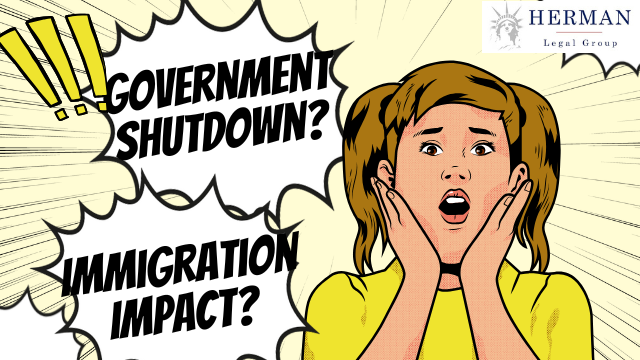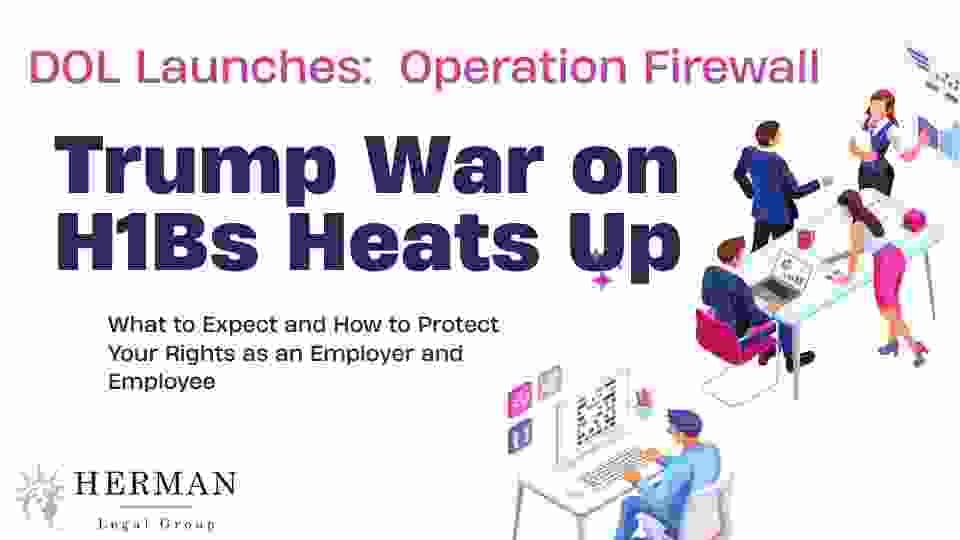On September 19, 2025 (the effective date of the new Project Firewall rules and fee requirements), the U.S. Department of Labor (DOL) launched Project Firewall, a sweeping enforcement campaign targeting alleged abuse of the H-1B visa program. U.S. companies are now directly affected, facing unprecedented audits, penalties, a $100,000 payment (fee) required for H-1B visa applications, and inter-agency investigations.
The move marks a turning point in President Trump’s (President Donald Trump) renewed war on H-1B visas — raising the stakes for U.S. companies and foreign professionals alike.
What Is Project Firewall?
Project Firewall is a new H-1B enforcement initiative unveiled by the Department of Labor’s Wage and Hour Division (WHD). According to the official DOL press release, it is designed to “detect, deter, and prosecute” fraud and abuse in the H-1B program. The H-1B program was intended for foreign workers to perform additive, high-value functions and perform services that supplement, rather than replace, the existing U.S. workforce.
What makes Project Firewall different from prior crackdowns:
- Secretary-Certified Investigations – For the first time, under the Department’s existing authority, the Secretary of Labor can personally certify investigations without a worker complaint when there is reasonable cause to suspect violations.
- Data-Driven Oversight – Artificial intelligence and advanced analytics will flag suspicious wage filings, job codes, and worksite patterns.
- Cross-Agency Action – DOL will coordinate with USCIS, ICE, DOJ, and EEOC to conduct investigations in parallel.
- Aggressive Enforcement – Investigations are expected to result in higher fines, debarments, and even criminal referrals.
Project Firewall grants DOL unprecedented power to launch H-1B investigations proactively, even in the absence of a worker complaint.
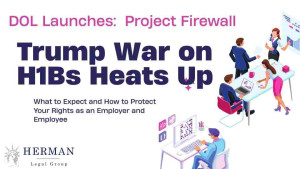
Protecting American Interests
The Trump administration’s launch of Project Firewall marks a decisive move to protect the interests of highly skilled American workers and reinforce the nation’s economic dominance. By targeting abuse in the H-1B visa program, the administration aims to ensure that high skilled jobs and high skilled functions are filled by qualified Americans first, rather than being outsourced to lower paid, temporary foreign workers.
The Department of Labor, under the leadership of Secretary Lori Chavez-DeRemer, is spearheading this initiative, working closely with relevant government agencies—including the Department of Homeland Security, U.S. Citizenship and Immigration Services, the Equal Employment Opportunity Commission, and the Department of Justice—to maximize compliance and safeguard American jobs.
Launching Project Firewall is a direct response to longstanding concerns that the H-1B program has been deliberately exploited to bring temporary workers into roles that should be reserved for American workers. The new proclamation, which introduces a $100,000 fee requirement for new H-1B visa applications, is designed to deter misuse and ensure that only employers with a genuine need for high skilled talent participate in the program.
This fee, combined with rigorous enforcement, is intended to prevent the displacement of American workers by lower skilled, lower paid foreign labor, and to ensure that the most valuable resource—the American worker—remains at the center of the U.S. economy.
The Department of Homeland Security plays a pivotal role in this effort, with the authority to determine when H-1B hiring is in the national interest and does not compromise national security. In cases where bringing temporary workers is deemed essential for the national interest, the Secretary of Homeland Security may exempt certain companies or industries from the fee requirement. This targeted approach ensures that the H-1B program supports U.S. economic and security priorities, rather than undermining them.
To further protect American interests, the Department of Labor will begin rulemaking to revise prevailing wage levels, ensuring that H-1B workers are paid fairly and that American workers are not undercut by lower wage offers. The Wage and Hour Division will provide compliance assistance to employers, helping them understand and meet their obligations under federal law. Employers and workers can access resources and support through the Wage and Hour Division’s toll-free hotline, ensuring that questions about compliance, wages owed, and employment practices are addressed promptly.
Project Firewall’s success depends on robust coordination among federal partners. The Department of Labor will share information and collaborate with agencies like the Department of Justice and the EEOC to combat discrimination and enforce federal law.
Employers found to be in violation may face civil money penalties, be required to pay back wages, or be debarred from future participation in the H-1B program. These measures are designed to hold employers accountable, protect American workers, and ensure that the H-1B program is used to bring in only those temporary workers whose skills are truly needed for the national interest.
By prioritizing highly skilled American workers and enforcing strict compliance, the Trump administration is taking bold steps to reestablish economic dominance and promote national security. Project Firewall is not just about enforcement—it’s about ensuring that the H-1B program serves its intended purpose: to fill critical high skilled jobs when no qualified Americans are available, not to displace the nation’s most valuable resource. As the Department of Labor continues to lead Project Firewall, it remains committed to protecting American interests and building a more secure, prosperous future for all.
Why Did the DOL Launch Project Firewall Now?
1. Trump’s Political Context (2025–2026)
Project Firewall is not occurring in isolation. It reflects a central plank of President Trump’s second-term immigration agenda. From day one, Trump promised to “end foreign worker abuses” and redirect jobs to U.S. citizens. The administration emphasized that H-1B policies should not leave Americans without job opportunities, aiming to ensure domestic workers are not disadvantaged by foreign visa programs.
By late 2025, several measures converged:
- September 19, 2025: Launch of Project Firewall and announcement of a $100,000 H-1B filing fee.
- September 2025 Proclamations: Restrictions on H-1B travel and reentry.
- Ongoing “Operation At-Large” targeting undocumented immigrants, which set the stage for wider worksite enforcement.
2. Longstanding Concerns About Abuse
Reports from the GAO and other oversight bodies raised concerns about:
- Wage underpayment relative to prevailing wage levels
- Outsourcing and third-party placements
- Workers being “benched” without pay between projects
- Critics argue that the H-1B program has sometimes been used to replace American workers with lower skilled labor, contrary to its original intent
3. Pressure from Political Allies
Labor unions and congressional allies have long lobbied for stronger oversight of H-1B employers. Trump seized this momentum to justify aggressive reform.
How Does Project Firewall Work?
Project Firewall uses a layered enforcement model to ensure that highly skilled jobs are protected for qualified Americans:
- Investigations and Subpoenas – DOL can demand payroll records, LCAs, contracts, and employee rosters.
- Audits and Site Visits – Inspectors may appear at employer worksites to interview H-1B employees and supervisors.
- Analytics and AI – Algorithms compare wage levels against industry and geographic benchmarks to detect anomalies.
- Cross-Agency Referrals – USCIS denials or EEOC discrimination claims may trigger parallel DOL action, and some enforcement actions may depend on what homeland security determines regarding national interest or security exceptions.
- DOJ Referrals – Severe or willful fraud cases are referred to the Department of Justice.
Project Firewall blends traditional audits with cutting-edge AI analytics and cross-agency coordination to root out H-1B violations.
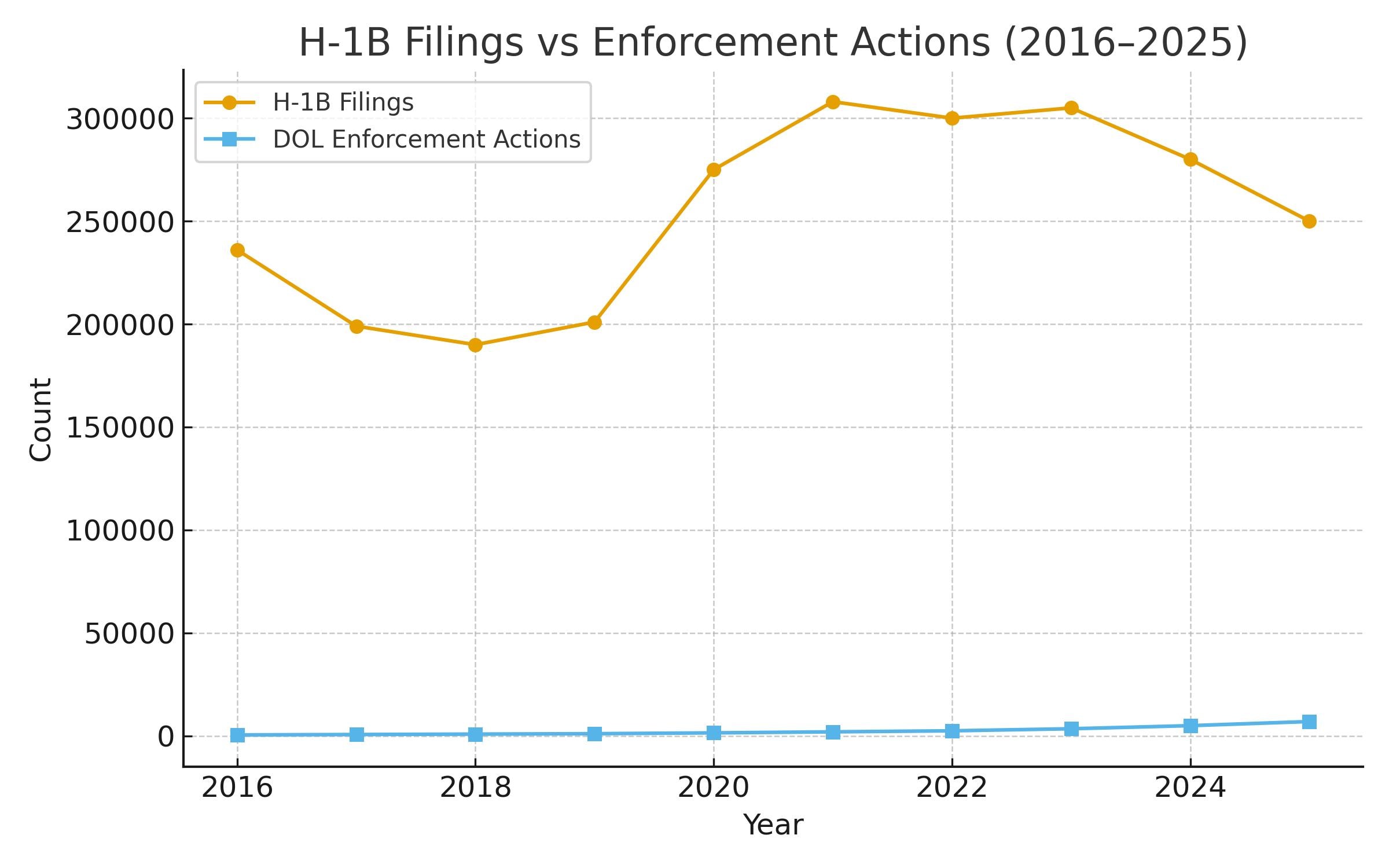
Scope of Enforcement
According to analyses by Holland & Knight and Stinson LLP:
- Industries: Tech, IT services, outsourcing, engineering, and consulting firms are priority targets.
- Violations: Wage underpayment, misclassification, failure to pay during nonproductive time, inaccurate LCA postings, and improper third-party placement.
- Geography: Nationwide, but concentrated in hubs like Silicon Valley, Seattle, Dallas, and New Jersey.
- Scale: Hundreds of audits expected in late 2025, with thousands more in 2026.
Rights of Employers During Project Firewall
Employers under investigation retain important rights:
- Notice of Allegations – Employers must be informed of the scope of violations under review.
- Right to Counsel – Employers can retain attorneys to handle audits and interviews.
- Opportunity to Cure – Some errors may be corrected without penalty if resolved promptly.
- Appeal Process – Decisions can be appealed to the Office of Administrative Law Judges and, ultimately, federal courts.
Rights of H-1B Workers
For H-1B employees caught in the crossfire, rights are equally critical:
- Right to Full Wages – Workers must be paid even during nonproductive time, as required by the LCA rules.
- Whistleblower Protections – Workers reporting violations are protected from retaliation
- Portability Rights – Workers may transfer their H-1B to a new employer if their sponsor is penalized
- Grace Periods – If terminated, workers generally have 60 days to find new employment.
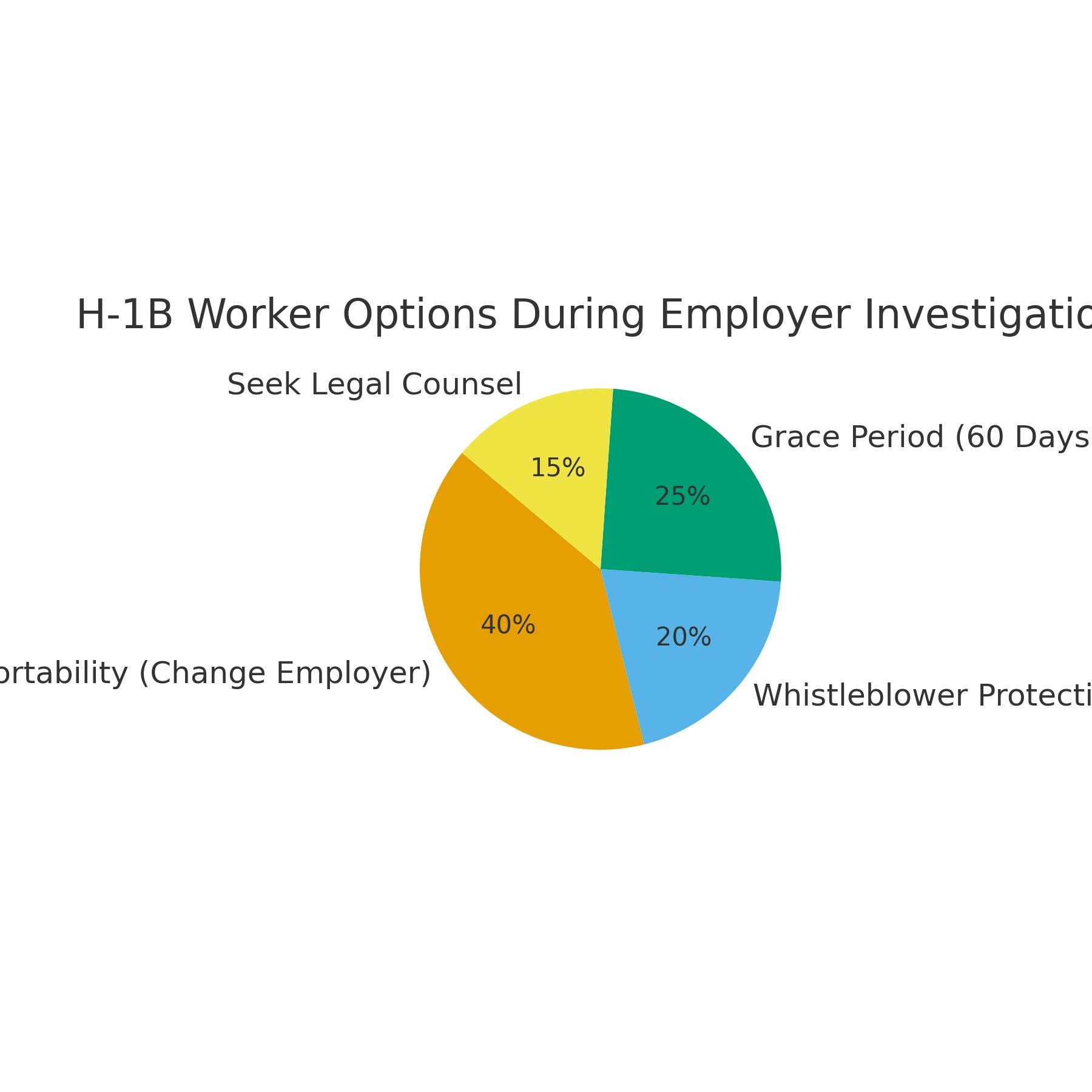
Penalties Under Project Firewall
Penalties are steep and wide-ranging:
| Violation | Penalty | Authority |
| Failure to pay required wages | Back wages owed to workers | DOL Wage & Hour Division |
| LCA misrepresentation | $1,000 – $35,000 per violation | DOL WHD |
| Failure to maintain public access file | Civil fines (varies) | DOL WHD |
| Retaliation against whistleblowers | Fines + reinstatement | DOL statutes |
| Willful violation | Debarment up to 3 years | 8 U.S.C. §1182(n) |
| Fraud or misrepresentation | DOJ criminal prosecution | DOJ |
Project Firewall penalties include fines up to $35,000 per violation, back wages, debarment, and potential DOJ prosecution.
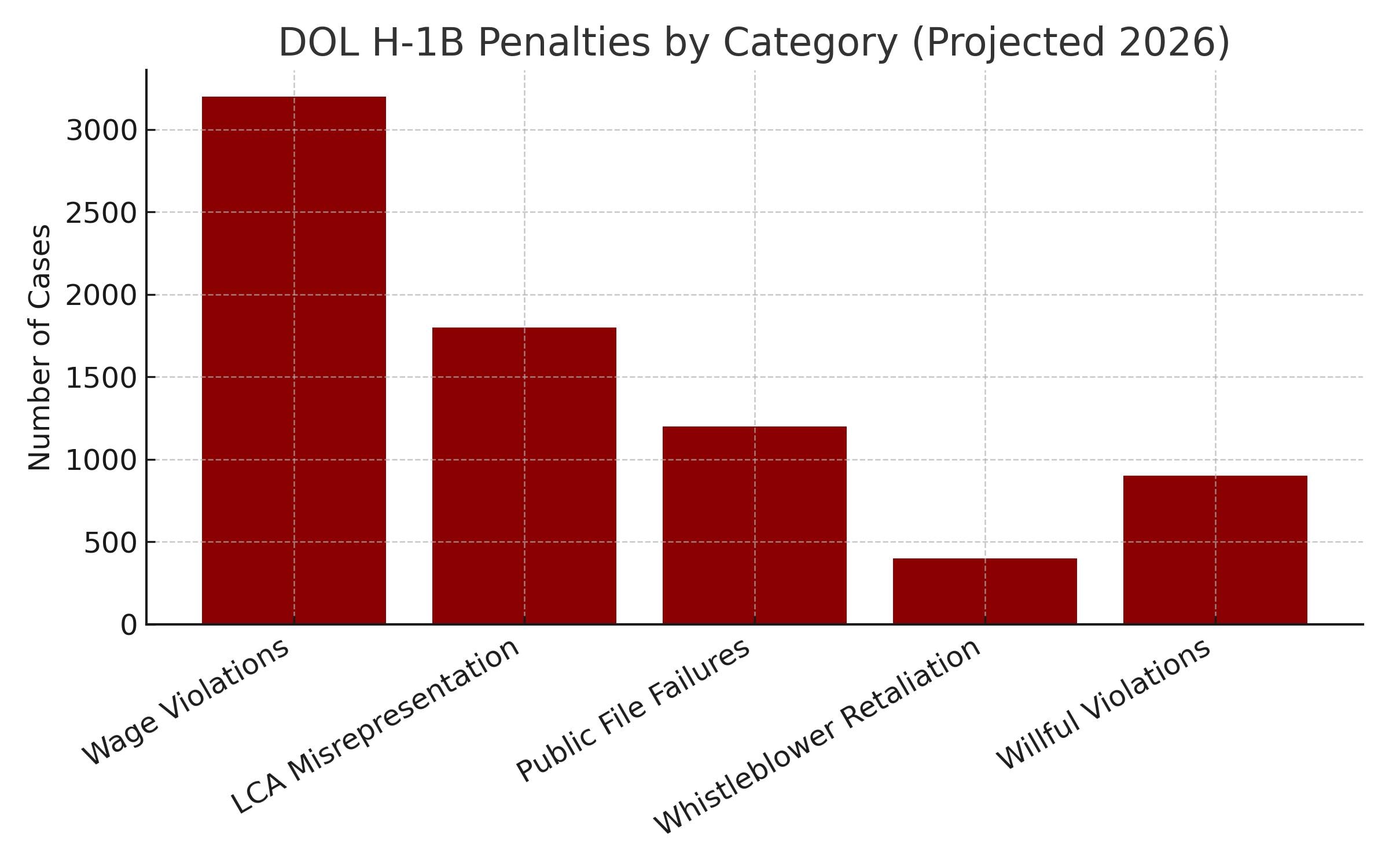
Comparison with Past Investigations
Project Firewall is the most aggressive H-1B enforcement campaign ever:
- 2009–2016: USCIS Fraud Detection and National Security (FDNS) site visits.
- 2017–2020 (Trump 1.0): “Buy American, Hire American” executive orders.
- 2021–2024 (Biden): Focus on modernization and legal challenges slowed enforcement.
- 2025 (Trump 2.0): Project Firewall — far broader, AI-driven, and politically endorsed at the highest level.
The Trump Administration’s War on H-1B
Project Firewall is the sharpest spear point in Trump’s broader anti-H-1B campaign:
- Rhetoric: Trump has repeatedly labeled H-1B visas as “cheap labor” harming U.S. workers.
- Policy: Beyond Project Firewall, new rules include:
- The $100,000 H-1B filing fee
- H-1B entry and reentry restrictions
- Proposals to eliminate H-4 EADs for spouses
- Goal: Reduce reliance on foreign labor, increase American hiring, and use enforcement as a deterrent.
Critics argue this “war” undermines U.S. innovation, hurts global competitiveness, and drives talent elsewhere. Supporters claim it restores fairness to U.S. workers.
Practical Steps for Employers
Employers can mitigate risk by:
- Conducting internal audits of LCAs and payroll records.
- Training HR managers on compliance obligations.
- Engaging experienced counsel for proactive strategies.
- Preparing for site visits with clear documentation.
- Creating whistleblower channels to catch problems early.
FAQs on DOL’s Project Firewall and Trump’s War on H-1B Visas
What is Project Firewall?
Project Firewall is a Department of Labor enforcement initiative launched on September 19, 2025, to investigate fraud, wage violations, and abuse in the H-1B visa program. It expands the DOL’s authority to initiate investigations without worker complaints and introduces new data-driven, cross-agency audits.
Why did the Department of Labor launch Project Firewall?
The initiative reflects President Trump’s second-term immigration strategy to restrict H-1B visas. It was launched in response to concerns about wage underpayment, outsourcing, and worker benching, as well as pressure from Congress and labor groups demanding stricter enforcement.
How does Project Firewall work?
Project Firewall relies on audits, subpoenas, AI-driven data analysis, and coordination with USCIS, ICE, DOJ, and EEOC. It allows the Secretary of Labor to directly authorize investigations, even if no complaint has been filed.
What types of violations does Project Firewall target?
The DOL is focusing on:
- Underpayment of wages below prevailing wage levels
- Misrepresentation of job titles, locations, and wages on LCAs
- Benching practices where H-1B workers go unpaid between assignments
- Improper third-party placements without documentation
- Failure to maintain required public access files
What penalties can employers face under Project Firewall?
Penalties include repayment of back wages, civil fines ranging from $1,000 to $35,000 per violation, debarment from the H-1B program for up to three years, and possible referral to the Department of Justice for criminal prosecution in cases of fraud.
Do employers have rights during Project Firewall investigations?
Yes. Employers are entitled to written notice of allegations, representation by legal counsel, opportunities to correct errors, and appeals through the Office of Administrative Law Judges and federal courts.
What rights do H-1B workers have if their employer is investigated?
H-1B employees are entitled to full wages, including during nonproductive time. They are protected against retaliation when reporting violations, have portability rights to transfer to another employer, and benefit from a 60-day grace period to seek new employment if terminated.
How is Project Firewall different from previous H-1B crackdowns?
While previous enforcement campaigns included random site visits and fraud detection programs, Project Firewall is broader. It uses AI analytics, inter-agency coordination, and the Secretary of Labor’s direct authority to initiate investigations proactively.
What is Trump’s overall stance on the H-1B program?
President Trump has long criticized H-1B visas as a “cheap labor” program. His administration has paired Project Firewall with other measures like the $100,000 H-1B filing fee, reentry restrictions, and proposals to end work permits for H-4 spouses.
How does Project Firewall fit into Trump’s broader war on H-1Bs?
Project Firewall is the centerpiece of a broader campaign to deter employers from sponsoring foreign workers. Together with new fees, travel bans, and stricter eligibility rules, it signals the most aggressive anti-H-1B posture in U.S. history.
Can H-1B workers be deported if their employer is penalized under Project Firewall?
If an employer is sanctioned, workers may lose status if they cannot quickly secure new sponsorship. However, portability provisions and grace periods offer workers opportunities to remain in lawful status while transitioning to a new employer.
What should employers do to prepare for Project Firewall investigations?
Employers should conduct internal audits of payroll and LCAs, train HR teams, engage immigration counsel, and establish compliance programs. Preparing for site visits and maintaining accurate records is essential.
Will Project Firewall reduce the number of H-1B filings?
Yes. The $100,000 filing fee, combined with the risk of audits and penalties, is expected to deter many small and mid-sized employers from filing new H-1B petitions, leading to a decline in applications.
Are lawsuits expected to challenge Project Firewall?
Legal challenges are anticipated, especially regarding the Secretary’s power to certify investigations without complaints. Employers and industry groups may argue that Project Firewall exceeds statutory authority and violates due process.
What industries are most at risk under Project Firewall?
Technology, IT services, consulting, and engineering firms face the highest scrutiny because of their reliance on H-1B workers and frequent use of third-party placement models.
How will Project Firewall affect U.S. competitiveness?
Critics argue that the crackdown will make it harder for U.S. companies to recruit global talent, harming innovation and economic growth. Supporters counter that it will create fairer labor markets for U.S. workers.
What role do whistleblowers play in Project Firewall investigations?
Whistleblowers are a key enforcement trigger. Workers who report wage violations, misclassification, or fraud can initiate investigations, and they are legally protected from retaliation by their employers.
What is the connection between Project Firewall and the $100,000 H-1B filing fee?
Both measures were announced on the same day and form part of the administration’s deterrence strategy. The fee aims to reduce filings, while Project Firewall ensures stricter oversight of those who do file.
Can employers still sponsor H-1B visas under Project Firewall?
Yes, but the compliance burden and risks are significantly higher. Employers must be prepared for detailed recordkeeping, audits, and possible public exposure if violations are found.
What is the long-term future of H-1B visas under Trump’s policies?
Unless challenged in court or reversed by a future administration, H-1B visas will likely become costlier, riskier, and less attractive for employers. For foreign professionals, opportunities may shrink, and competition for sponsorship may intensify.
Protect Your Future in the Age of Project Firewall
If you are an H-1B professional fearing retaliation or loss of status, or an employer worried about sudden DOL audits, penalties, and investigations under Project Firewall, you are not alone. The Trump administration has launched the most aggressive war on H-1Bs in U.S. history, combining massive filing fees, restrictive entry rules, and sweeping Department of Labor investigations.
These changes are not just headlines — they directly affect your career, your business, and your family’s future in the United States. Every mistake in compliance, every delay in action, could mean fines, debarment, or the loss of lawful status.
That’s why you need a trusted, experienced advocate at your side. Attorney Richard T. Herman, co-author of Immigrant, Inc., has spent more than 30 years fighting for immigrants and employers across the nation. He and the Herman Legal Group understand the fear and uncertainty caused by Project Firewall and know how to build proactive strategies to protect you.
📞 Call 1-800-808-4013 today or schedule a confidential consultation online. Don’t wait until an investigation notice or penalty arrives. Take control now, safeguard your future, and put a nationally recognized immigration lawyer on your side.
Resource List: DOL Project Firewall & Trump’s H-1B Crackdown
Government Agencies & Programs
- U.S. Department of Labor – H-1B Program – Official rules, compliance requirements, and FAQs for H-1B employers and workers.
- DOL Newsroom – Press Releases – Announcements including the September 19, 2025 launch of Project Firewall.
- Office of Administrative Law Judges (OALJ) – Appeals process for DOL enforcement decisions.
- Whistleblower Protection Program (DOL) – Protections for workers who report employer violations.
- USCIS Policy Manual – Comprehensive regulations and policy interpretations.
- DOJ Civil Rights Division – Employment Section – Investigations of discriminatory hiring or employment practices.
- ICE – Worksite Enforcement – Employer investigations and compliance operations.
- EEOC – Guidance and Laws – Retaliation and discrimination protections relevant to H-1B workers.
- GAO Reports on H-1B and Skilled Immigration – Oversight audits and program reviews.
- Federal Register – Immigration Notices – Rules and policy changes published by the government.
Professional Associations & Policy Groups
- American Immigration Lawyers Association (AILA) – Legal resources and practice updates on H-1B and DOL enforcement.
- National Immigration Forum – Advocacy for immigrants and high-skilled labor.
- American Immigration Council (Immigration Policy Center) – Policy analysis and legal research.
- Migration Policy Institute (MPI) – Nonpartisan immigration research, including high-skilled worker programs.
- National Foundation for American Policy (NFAP) – Data-driven studies on H-1B visas and economic impacts.
- Bipartisan Policy Center – Immigration Initiative – Research on bipartisan immigration reform proposals.
- CompTIA – Public Advocacy – Tech industry advocacy on high-skilled immigration.
- Information Technology Industry Council (ITI) – Policy stances of tech companies on H-1B and skilled labor.
- National Employment Lawyers Association (NELA) – Worker-side legal advocacy including immigrant worker rights.
- ABA – Section of Labor and Employment Law – Professional resources for attorneys handling employment and immigration compliance.


